The wasted potential of Prison Break
After a promising first season, how did Prison Break go off the boil so quickly? Jamie revisits the whole run, with major spoilers...
Warning: this feature contains major spoilers for Prison Break.
I only started watching Prison Break earlier this year. Midway through its first season I shared my high praise for the series on Facebook. I felt ashamed it had taken me so long to discover the delights of this fine piece of nerve-shredding, gut-busting entertainment, and wanted the world – or at least my own little on-line fragment of the world – to know it.
The responses on my newsfeed, from those who’d stuck with the show to the end, were uniform: ‘First season: great. Second season: good. Third season: bad. Fourth season: awful.’ My friends urged me – and humanity itself – not to watch past the season two finale. Their warning was similar to that which you might use to dissuade a young lad from rushing to the hospital for one last moment with the still-warm corpse of his favorite grand-uncle: ‘Just remember the good times you had together, lad. You don’t need to see that.’
Well, we’ve all had fingers burnt in defiance of the command: ‘Don’t touch that, it’s hot.’ It’s human nature. So I resolved to ‘stick it to the man’ and keep watching Prison Break until the bitter end, no matter what its detractors said, or in which direction the series happened to evolve. There would be no half measures in my commitment. Even if Lincoln inexplicably regenerated into the Fourteenth Doctor, or Michael was unmasked as a Cylon: so what? I could take it. I’d seen worse. I’d watched three seasons of Drop Dead Diva, for Christ’s sake! (I’m not being literal. Christ asks much of his people, but even he has to draw the line somewhere.)
Having now witnessed the entire saga from prison to prison and break to break, and back again – and back again etc. – comes the time to weigh up the experience, from the good, to the bad, and the WTF-ly…
The good: season one
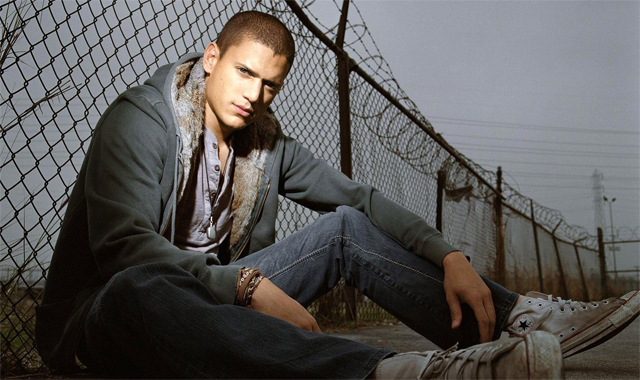
Sometimes it’s better to watch a completed series on DVD. That way, you can judge the show’s quality based on how many times you sell yourself the old lie: ‘I’ll just watch one more and then go to bed.’ Prison Break‘s first season turned me into a drooling insomniac. My couch left imprints on my exposed body and face that were almost as intricate as Michael’s tattoos. I couldn’t get enough of it, to the detriment of my health, relationships and the survival of my pet fish. (Relax, I don’t have any fish.) (Well, not now, anyway.)
Yes, the premise is absolutely batshit crazy: Genius structural engineer Michael Scofield spends hundred of hours and thousands of pounds tattooing himself with the disguised blueprints of a maximum security prison he himself helped design, and in which his brother, Lincoln – framed by a shadowy cabal called The Company for the murder of the vise President’s brother – just happens to be incarcerated on Death Row. Michael then engineers his own arrest and imprisonment in said facility so that he can break his brother out before the poor lump gets his head fried off in the electric chair. And he only has four weeks in which to accomplish this task. So far, so certifiable. And that’s even before we take into account the giant matchstick model of the Taj Mahal that Michael’s compelled to structurally reinforce by the prison’s wishy-washy warden. Oz this aint.
But you don’t – you can’t – go in to Prison Break‘s first season expecting gritty realism or strict adherence to the rules of logic or plausibility. You wouldn’t want to. Not when it’s this much fun. Sure, there are screeds of stock characters, a whole cell-block full of cliches, and more than a soupcon of silly moments, but, ultimately, you’ll be too busy trying to stop your adrenal gland from hijacking your heart to care. The show’s entire first season is a glorious, twenty-four-episode homage to every prison break movie you’ve ever seen, with a helter-skelter of tinfoil-hatted, pant-crapping madness thrown in for free. I can’t say that it’s the ‘best’ first season of any show ever. It’s definitely not (the cliffhanger ending sucks ass, for a start). But it is, without doubt, one of the most entertaining, compulsive and exciting.
T-Bag
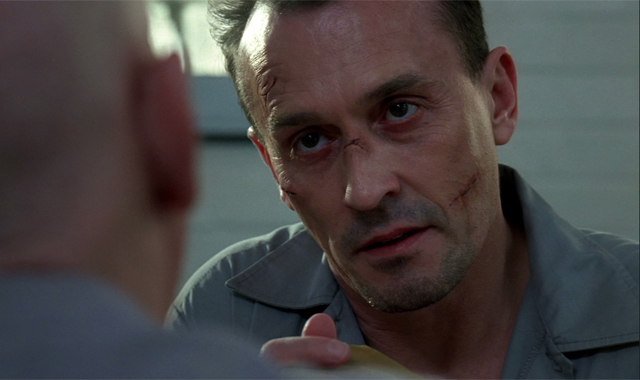
When one of your favorite characters is a homicidal, bisexual, paedophilic, racist rapist, you just know that the show you’re watching is either doing something very wrong, or something very right. Or quite possibly both. Even though you know T-Bag is well past his being-alive-by-date almost from the first episode, by virtue of his sick and unstoppable sociopathic drives, you can’t help but pray for his continued survival, if only because he’s an incredibly interesting – and often very funny – character. Kudos to Robert Knepper, whose portrayal of this highly-intelligent but irredeemably depraved monster is a joy to behold.
Mahone
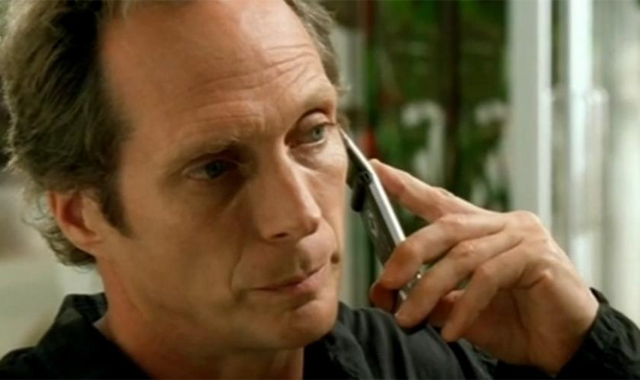
Dodgy, Company-corrupted FBI agent Alexander Mahone is like a cross between Sherlock Holmes and Dirty Harry. With his wiry frame, block-of-flats forehead, and wild, big bug eyes, he looks like one of the skeletons from his own closet. Or Jon from Garfield after a ten-year battle with cocaine addiction. Apt, as he’s hooked on drugs; drugs that help him walk the tightrope between madness and… well, more madness.
When we first meet Mahone, he’s in charge of tracking down – and secretly eliminating – the recently escaped Fox River eight, during which cat-and-mouse hunt he proves more than a match for Michael in the genius stakes. He’s the kind of blinkered, brutal, suspect-murdering motherfudger you definitely don’t want on your tail.
Mahone spends most of the series fighting demons, inside and out, all in the name of exorcising his guilt, saving his family and exacting revenge on the puppet-masters pulling his strings. He’s both chaser and chased, and in season three even ends up joining his quarry behind bars in a hellish, South American prison. However, once Mahone’s firmly on the side of Michael’s angels you’ll quickly forgive him for all of the dubious things he did under duress. Hell, if Michael and Lincoln can forgive him, who are we to hold a grudge? In short, Mahone’s a quick-brained, twitchy, kick-ass kook with a whole holster full of crazy: you’ll love him.
The bad: almost everything in the fourth season, apart from the big, mean, dead-eyed black guy who was trying to kill them and was a bit like a human Terminator
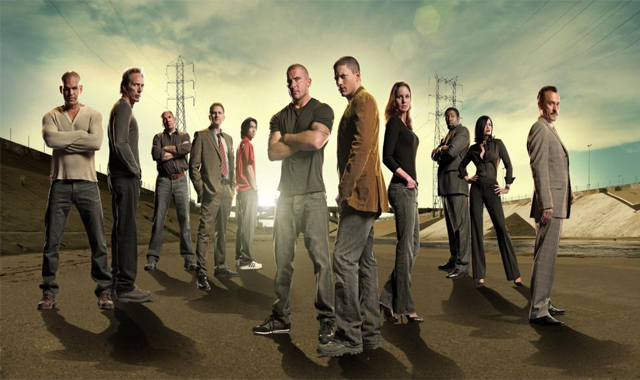
Speaks for itself, really.
Michael’s no-kill rule
Michael’s refusal to take a life under any circumstances seems noble at first, but it quickly becomes apparent that it’s the dumbest approach to ethics – not to mention combat strategy – ever adopted. So, you’ve come face to face with the evil architect of an off-the-grid government conspiracy, who’s already a) killed approximately forty of your own friends and family b) decimated the nation of Laos c) vowed to kill you if it’s the last thing he does, and d) has his little black heart set on visiting havoc upon the entire planet in pursuit of his megalomaniacal dreams… probably best just to kill him, right, Michael? Michael? Michael??!!
Oh, come on, Michael, you’re not the Doctor. Nobody grudges you the odd perfectly justifiable murder. Just take your gun out and blow that bad guy away. You’re on the Fox network, man, not the God Channel.
Brad Bellick
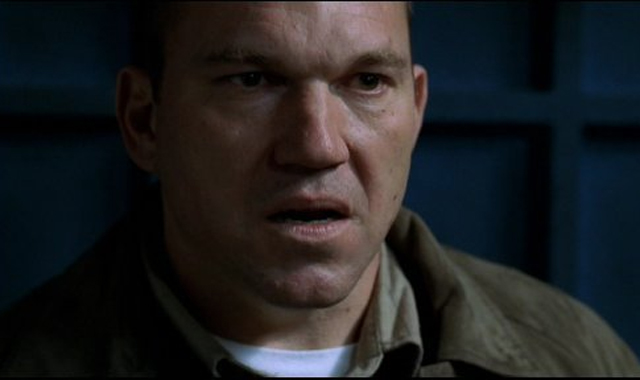
Bellick begins the series as an archetypal bullying prison guard, complete with raging inferiority complex, openness to greed and corruption, and poor social and sexual skills. Physically, he looks like Jon Bernthal thirty years from now after a few too many fish suppers and a rough divorce. Psychologically, he’s a cross between Bluto from Popeye and Rimmer from Red Dwarf.
The main problem with Bellick is that once he becomes a good guy he becomes flat, boring, and surplus to requirements. That makes his death inevitable. Unfortunately, it also makes it unremarkable. I felt nothing when he died, even though his death was noble and selfless, and even though the other characters seemed – somewhat unbelievably – completed devastated by their loss: even T-Bag, Bellick’s mortal enemy, shed a few tears, and they’d tried to kill each other innumerable times. Worst of all, though, his death wasn’t even a shock or a surprise. It couldn’t have been telegraphed more blatantly if Bellick had spent his final episode wearing a T-shirt emblazoned with the caption: ‘That’ll be me dead, then.’
Michael and Sara
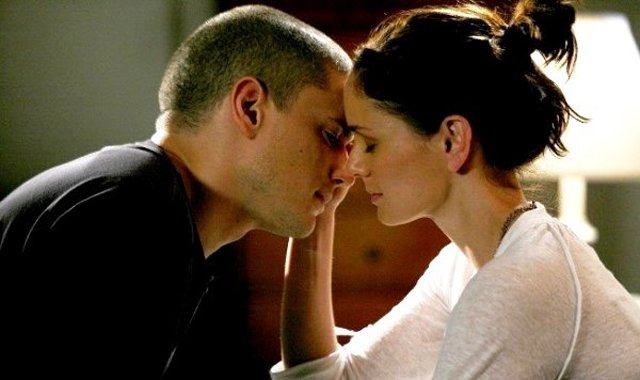
We are meant to believe that Michael’s love for Sara Tancredi, and vise versa, is worth killing, lying, and dying for. So it’s a pity that their coupling generates less sexual chemistry than a night of passion between two dead pandas, and achieves the same level of raw emotional intensity as a mid-afternoon motivational sales conference for door-to-door swamp-brush sellers attended by only one man, who spends the entire seminar asleep. Let’s be honest: Luke and Leia are hotter together.
I’ll concede that there are mitigating factors. After all, Michael and Sara spend most of their days being tortured or breaking out of prisons, leaving precious little time for cuddles. However, in The Walking Dead, Shane and Lori (played by Sarah Wayne Callies, who also plays Sara in Prison Break) manage to maintain a passionate affair in the face of a billion-strong zombie horde. Compared to that, ‘ooooh, help, the government’s constantly trying to kill me’ is no excuse for a limp romance.
Unfortunately, the absence of an emotional connection between the two lovers also serves to dilute the impact of Michael’s self-sacrifice for Sara at the end of Final Break. I should have felt the unbearable weight of their eternal separation. I should have been rocking, wailing and sobbing. I wasn’t: I was playing Candy Crush.
Incidentally, while we’re on the subject of Final Break: that’s the ending? Really? Michael goes through hell to save his family when he could have just sat back designing shopping malls for the rest of his life, and that’s his reward?
Family Ties
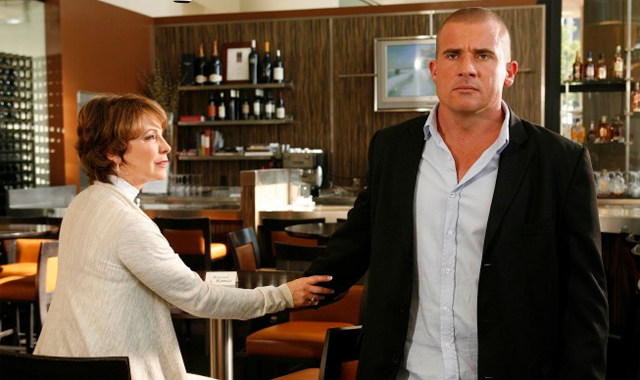
If there’s one obvious sign that a show’s just bought a flashy new pair of water skis and is desperately trying to find a Groupon for ‘Shark Jumping’ it’s the big ‘my family are the baddies’ reveal. Creatively speaking, by the time Prison Break resorted to this soap-style ‘shocker’ the show was already about as fresh as a recently re-animated corpse, but this last-ditch twist was definitely the final crossbow in the eye from Daryl (these The Walking Dead references are getting a bit out of hand now).
Michael and Lincoln discovered early on in the series that their Dad was a good guy gone bad guy gone good guy again, just in time for him to be shot dead by Mahone. In fact, their Dad’s long-ago defection from the Company turned out to be the catalyst for most of the horrible shit that happened to the two brothers (and anyone who was unlucky enough to cross their paths). As the show entered the final half of its final season, I remember turning to my girlfriend and saying: ‘If it turns out that their dead mom is not only secretly alive, but also one of the main baddies and an architect of Michael and Lincoln’s destruction, I’m going to smash our TV into tiny little pieces with an axe.’ Luckily, I’m far too skint and miserly to be able to afford an axe, much less a replacement TV… so I just sighed and shook my head.
The WTF-ly: let’s do the twist
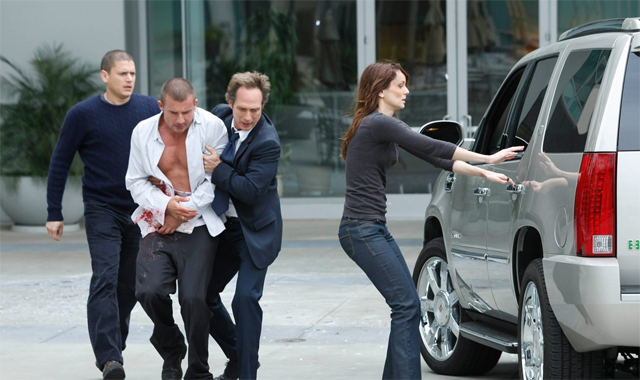
I could write an entire ‘WTF’ feature about Prison Break‘s twisted layers of conspiracy alone, but instead I’ll give a brief summary of some of their more ridiculous elements: a dead guy who fakes his own murder and hides out in a mansion in the country after treating himself to a minor facelift; a bird-watching guide filled with coded secrets that for some bullshit reason is important; allegiances switching with the same ugly fury as couples at an over-fifties swingers’ party; lots of definitely dead people miraculously coming back to life; the Company forcing Michael to break a key man out of an impenetrable South American prison instead of just using their own unlimited power and resources; the very fact that Michael is chosen for this prison break even though he’s world famous for breaking out of prisons; and a squad of agents each holding a piece of an electronic puzzle that unlocks a secret vault containing something deeply, deeply underwhelming.
Prison Break‘s conspiracy elements are to its narrative what a pile of boulders are to a sack of sea-bound kittens. Basically, the series – which could have stayed cute, quirky and loveable – slowly sinks and drowns under the weight of its own shoddy and convoluted plotting. And, yes, I’m willing to concede that I could have conveyed that sentiment without recourse to dead kitten imagery, but I doubt it would have been as much fun to write.
The narrative of Lost may have been a web woven by a spider on crack, but at least its fans could fall back on – and lose themselves in – the show’s mythology. As the seasons dragged on, Prison Break became like Lost minus the mysticism, and fifty times more frustrating. Twisting, turning, leaping, looping, it became the kind of show that would introduce a character who was either a goody or a baddy, and just when you thought you’d worked out which they were, you suddenly realised that you really didn’t care any more.
And sometimes, just sometimes, it introduced you to a guy like Agent Kellerman: a bad guy turned even badder guy turned reluctant good guy turned good guy turned dead guy turned ‘how the hell is he alive again, that doesn’t make any fucking sense?’ guy. Yes, Kellerman comes back from the dead in time for the final season’s final episode, and simply strolls up to Michael and says something like: ‘It’s cool, mate. I caught the baddies and fixed everything. See you later.’
Still, at least Kellerman never showed up in rude health after we’d seen his decapitated head in a box, like some Saras I could mention. Honestly, if you’re going to decapitate a character, the rule is they’ve got to stay decapitated. Remember Highlander! I know Sarah Wayne Callies fell pregnant between the second and third seasons, and reluctantly left the show because the network couldn’t – or wouldn’t – give her any leeway with the production schedule, but the life of the story should have taken precedence over the life of Sara Tancredi. She shouldn’t have been allowed to return. Think how shit the end of Se7en would have been if Kevin Spacey had walked up to a screaming Brad Pitt and said, ‘Only joking, pal, it’s a fake head; Gwyneth’s at her pilates class.’
Screw you, Prison Break. Screw you.
In conclusion: the mini-review
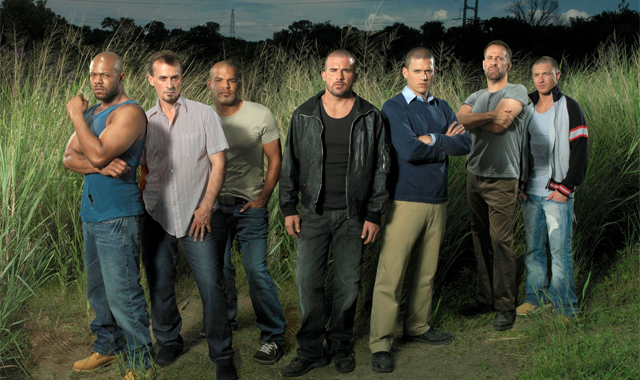
First season: awesome. Second season: good. Third season: more good than bad. Fouth season: ‘interesting.’
Now that it’s all over, would I give newcomers to the show the same warning I was given by my Facebook friends? No. Prison Break‘s worth the watch. It may be a mini-series-sized idea stretched far beyond its limits, but even in its worst moments the show still has plenty of T-Bag and Mad Man Mahone to entertain – and the later seasons aren’t entirely without their charm. Season three feels a bit like Spartacus: Blood and Sand, even going so far as to cast T-Bag in the role of Ashur; and with the added bonus of Bunny Colvin from The Wire playing a brutal, drug-smuggling kingpin. And season four is… well… you know it’s… sort of, you know… yeah…
Oh hell, just watch it.
